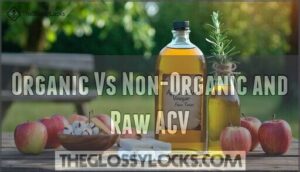This site is supported by our readers. We may earn a commission, at no cost to you, if you purchase through links.

This DIY solution combines raw ACV with water to create a natural astringent that balances your skin’s pH, fights acne-causing bacteria, and gently exfoliates dead cells.
The key lies in proper dilution—typically 1:3 ACV to water for normal skin—and choosing raw, unfiltered vinegar with the "mother" for maximum benefits.
Unlike commercial toners packed with synthetic ingredients, you’re controlling exactly what touches your face.
While it won’t work miracles overnight, consistent use can tighten pores and reduce breakouts naturally.
The secret to avoiding irritation while maximizing results comes down to technique and timing.
Table Of Contents
- Key Takeaways
- What is Apple Cider Vinegar Face Toner
- Benefits of Apple Cider Vinegar Toner
- How to Make ACV Face Toner at Home
- Using Apple Cider Vinegar Toner Safely
- Choosing The Best Apple Cider Vinegar for Skin
- ACV Toner Vs Commercial Toners and Alternatives
- Frequently Asked Questions (FAQs)
- What is an apple cider vinegar facial toner?
- How do you use apple cider vinegar toner?
- How to use apple cider vinegar on the face?
- Does apple cider vinegar tighten skin?
- Is apple cider vinegar good for face toner?
- What does apple cider and vinegar do for your face?
- How to make facial toner with apple cider vinegar?
- Does ACV toner help with skin elasticity and firmness?
- How does ACV toner interact with other skincare products?
- Can I use ACV toner if I have rosacea or red skin?
- Conclusion
Key Takeaways
- Start with proper dilution ratios – Mix 1 part ACV with 3-4 parts water for normal skin, or up to 1:4 for sensitive skin to avoid irritation and burning
- Choose raw, unfiltered ACV with "the mother" – You’ll get maximum benefits from the beneficial bacteria, enzymes, and acids that processed versions lack
- Apply correctly and build tolerance gradually – Use a cotton pad to apply after cleansing, skip the eye area, and start 2-3 times weekly before increasing frequency
- Patch test first and listen to your skin – Test behind your ear before facial use, and stop immediately if you experience redness, burning, or irritation
What is Apple Cider Vinegar Face Toner
Apple cider vinegar face toner is a natural skincare solution made by diluting raw ACV with water to create an astringent that helps balance your skin’s pH and remove impurities after cleansing.
Unlike commercial toners that often contain synthetic chemicals, ACV toner harnesses the natural acids and antimicrobial properties of fermented apple juice to potentially reduce acne, tighten pores, and gently exfoliate dead skin cells, which can help to reduce acne.
Nature’s most powerful toner harnesses fermented apple acids for clearer, balanced skin
Definition and Purpose of ACV Toner
An apple cider vinegar face toner is a natural skincare solution that combines ACV’s astringent acids with water to cleanse and refresh your skin after washing.
This DIY facial toner removes leftover impurities, balances your skin’s pH levels, and prepares your face for serums and moisturizers in your skincare routine.
Using apple cider vinegar can also help with sebum management issues to achieve healthier skin and hair.
Key Ingredients and How It Differs From Others
Unlike regular commercial toners that rely on synthetic ingredients, your apple cider vinegar natural face toner harnesses specific natural components.
This natural skincare approach offers unique pH Balance benefits through its acidic composition.
Key components that set ACV toners apart:
- Acetic acid – provides antimicrobial properties and gentle exfoliation
- Malic acid – supports cellular turnover for smoother skin texture
- Natural additives like essential oils enhance the basic toner recipes
- Raw ACV with "mother" delivers probiotics absent in commercial alternatives
This combination creates a customizable facial toner that adapts to different skin types while maintaining effectiveness in your skin care routine.
Historical Use of Vinegar in Skincare
Throughout history, people have turned to vinegar as a trusted skincare ally.
Ancient civilizations discovered vinegar benefits for cleansing and rejuvenating skin, while early 1900s women embraced this natural face toner alongside botanical ingredients.
From ancient beauty wisdom to modern skincare—vinegar has cleansed and rejuvenated faces for centuries
This skincare evolution from ancient remedies to modern apple cider uses shows how natural ingredients maintain their botanical roots in our skin care routine.
Benefits of Apple Cider Vinegar Toner
Apple cider vinegar toner offers several science-backed benefits that can transform your skincare routine.
From balancing your skin’s natural pH to reducing breakouts, this affordable DIY solution addresses multiple skin concerns with ingredients you likely already have at home, providing a science-backed and affordable way to improve your skin.
Balancing Skin PH Levels
Balance is everything in regard to your skin’s natural state.
Healthy facial skin thrives at a slightly acidic pH between 4.5 and 5.5, but harsh cleansers and environmental factors can disrupt this delicate equilibrium.
Apple cider vinegar’s acidic properties help restore ideal pH levels, supporting your skin’s protective barrier and promoting healthier-looking skin naturally.
Using a skin health guide can provide more insights into the benefits of apple cider vinegar for the skin, and help maintain the skin’s natural state.
Reducing Acne and Blemishes
When acne strikes, ACV’s antimicrobial properties become your skin’s backup.
The acetic acid in this natural skin toner fights acne-causing bacteria while gently purifying pores.
Studies suggest ACV’s organic acids may reduce inflammation and blemishes, making it a promising acne treatment.
However, proper dilution remains essential for effective blemish removal without irritation.
Exfoliating and Removing Dead Skin Cells
ACV’s organic acids work like a gentle chemical peel, breaking down bonds between dead skin cells for natural skin exfoliation.
This dead cell removal process reveals fresher skin underneath while promoting cell renewal.
Your homemade toner becomes a facial smoothing powerhouse, clearing away the cellular debris that clogs pores and dulls your complexion naturally.
By utilizing the acetic acid properties, you can enhance the effectiveness of your toner in achieving balanced skin pH levels and promote natural skin exfoliation through the use of gentle chemical peel properties.
Tightening Pores and Improving Texture
Beyond removing dead skin cells, ACV’s astringent properties work to tighten and refine your skin’s surface.
The natural acids help minimize enlarged pores while promoting smoother texture.
Here’s how ACV enhances your complexion:
- Pore Minimization – Astringent acids contract pore openings, creating a refined appearance
- Skin Smoothing – Regular use with this homemade toner helps even out rough patches
- Texture Refining – Natural facial firming occurs as vinegar for skin tightens and tones
This DIY face toner recipe offers complexion enhancement without harsh skincare products chemicals.
Potential Anti-Aging and Scar Fading Effects
While ACV’s antioxidants may protect against oxidative stress that accelerates aging, solid evidence for skin regeneration and collagen boost remains limited.
The acetic acid provides gentle exfoliation that could help with facial rejuvenation, but claims about significant scar reduction need caution—improper use can worsen scarring.
Using an acv skin toner can be beneficial for maintaining skin health.
| Potential Benefits | Research Reality |
|---|---|
| Anti aging through antioxidants | Limited human studies available |
| Natural beauty alternative to harsh skincare products | Mostly anecdotal evidence |
| Face toner recipe for vinegar for skin use | Risk of irritation if misused |
How to Make ACV Face Toner at Home
Making your own apple cider vinegar toner is surprisingly simple and requires just a few ingredients you probably already have at home.
You’ll need to dilute the vinegar properly for your skin type and can customize it with essential oils or other beneficial add-ins to create a personalized skincare solution that is simple to make.
Basic ACV Toner Recipe Step-by-Step
Creating your basic ACV toner couldn’t be simpler.
You’ll need just two ingredients: apple cider vinegar and filtered water.
Start with proper ACV dilution by mixing one part vinegar with three parts water for most skin types.
Pour both into a clean glass container, shake gently, and you’re done.
This DIY recipe delivers natural beauty benefits without harsh chemicals, making it perfect for those seeking organic skincare solutions.
Enhanced Recipes With Essential Oils and Add-ins
Once you’ve mastered the basic recipe, you can customize your toner for skin with aromatic benefits.
Essential Oil Blends like lavender or chamomile offer soothing properties, while tea tree targets acne-prone areas.
Custom Recipes can include witch hazel for oily Skin Types or rosewater for sensitive complexions.
These Toner Additions enhance your organic skincare routine with targeted face care tips for ideal skin health tips.
Using natural ingredients for homemade face toner recipes allows for complete control over the formulation and customization for specific skin needs, providing complete control and enabling customization for specific skin needs with organic skincare.
Proper Dilution for Different Skin Types
Your skin type determines your dilution ratio for safe, effective results.
Start with 1:4 (one part ACV to four parts water) for sensitive skin, 1:3 for normal skin, and 1:2 for oily skin.
These ratios maintain pH balance while preventing irritation.
Always patch test first—your face will thank you later!
Understanding the proper ACV face toner products is essential for achieving the best results.
Storage Tips and Shelf Life
Your homemade ACV toner stays fresh when stored properly. Keep it in a glass container away from direct sunlight, and it’ll maintain its potency for months.
Unlike many beauty products, this DIY facial care solution doesn’t require refrigeration, making it convenient for your health and skincare routine.
- Container Selection: Use dark glass bottles or mason jars to protect from light damage
- Storage Conditions: Store at room temperature in bathroom cabinets or cool, dry areas
- Shelf Life: Properly stored ACV toner lasts 3-6 months without preservatives
Handle your toner with clean hands to prevent contamination. While store-bought beauty products have expiration dates printed on labels, your DIY version relies on visual and smell checks.
If it develops an off odor or changes color, it’s time for a fresh batch.
Using Apple Cider Vinegar Toner Safely
You’ll want to approach ACV toner application with care, since the acids can irritate skin if used incorrectly.
Following proper dilution ratios and starting slowly helps you reap the benefits while avoiding potential side effects like redness or burning, allowing you to use the product effectively and safely with proper application.
Step-by-Step Application Process
After cleansing, apply ACV toner using a cotton pad or spray bottle, avoiding the delicate eye area.
Let your skin drink up the benefits—no rinsing required!
This simple application transforms your facial care routine into an effective beauty ritual.
| Step | Action | Application Tips |
|---|---|---|
| 1 | Cleanse face thoroughly | Remove all makeup and impurities first |
| 2 | Apply toner with cotton pad | Gentle upward strokes, avoid eye area |
| 3 | Let absorb completely | No rinsing needed—skin will feel refreshed |
| 4 | Follow with moisturizer | Wait 30 seconds before applying other beauty products |
| 5 | Store remaining toner properly | Keep in cool, dark place using proper Storage Methods |
To ensure the best results, follow these steps carefully and remember to wait 30 seconds before applying other beauty products after moisturizer.
Frequency of Use and Routine Integration
Once you’ve mastered application technique, establishing the right frequency becomes your next priority. Think of ACV toner like exercise—consistency matters more than intensity.
Here’s your Daily Routine framework:
- Morning Application: Start with 2-3 times weekly, then increase as your Skin Types adapt
- Nightly Use: Perfect for deeper cleansing after removing makeup and pollutants
- Toner Frequency: Listen to your skin—oily types handle daily use better than sensitive ones
- Health monitoring: Watch for irritation and adjust accordingly
Most people find success using ACV toner every other day initially. You can gradually increase frequency as your skin builds tolerance. Store your homemade blend properly for consistent results, and remember that Shopping for quality Apple ingredients makes a difference in your skincare Education journey.
Tips for Sensitive or Damaged Skin
Before sensitive skin meets ACV, you’re stepping into delicate territory. Start with a 1:4 dilution ratio and patch-test behind your ear first.
If damaged skin shows redness or burning, stop immediately—your skin’s vision for health shouldn’t include irritation.
Gentle exfoliation comes with patience, not force. Skip ACV during active breakouts or wounds.
Instead, focus on skin soothing alternatives like aloe vera until your pH balance stabilizes and your skin’s natural safety barriers rebuild.
Understanding sensitive skin types is essential for effective skincare routines.
Choosing The Best Apple Cider Vinegar for Skin
When shopping for apple cider vinegar to create your DIY face toner, you’ll want to choose raw, unfiltered varieties that contain the "mother" for maximum skin benefits.
The type and quality of ACV you select can substantially impact your toner’s effectiveness and your skin’s response.
Organic Vs Non-Organic and Raw ACV
Quality matters when choosing apple cider vinegar for your toner.
Organic certification guarantees no synthetic pesticides touched those apples, reducing potential skin irritants. Raw benefits shine through unfiltered varieties—they’re cloudy but nutrient-rich.
Processing methods strip away helpful compounds, so raw apple products retain more malic acid for gentle exfoliation.
Health-conscious folks prefer organic apple devices over conventional options for good reason, prioritizing organic certification.
Importance of The “Mother” in ACV
The "mother" in raw ACV is a cloudy substance containing beneficial bacteria and enzymes that enhance skincare benefits.
Look for these visual identification markers when selecting ACV for toning:
- Cloudy, web-like strands floating in the bottle
- Sediment settling at the bottom requiring gentle shaking
- Unfiltered appearance rather than crystal-clear liquid
- Enhanced benefits from mothers enzymes and mothers nutrients
Raw ACV with the mother provides superior health advantages compared to heavily processed apple products. The filtering effects of commercial production remove these valuable compounds, reducing the toner’s effectiveness for your skin.
Recommended Brands for Skincare Use
When selecting ACV for your face toner, Bragg Organic Raw Unfiltered consistently tops dermatologist recommendations with a 4.7/5 rating.
WhiteHouse Organic offers triple-filtered purity, while Dynamic Health provides dual fermentation benefits.
Vermont Village appeals to those wanting locally sourced apples. For those interested, you can find Bragg ACV products online.
Check customer reviews at your preferred retail store or AppleStore for authentic feedback on brand ingredients and production methods.
ACV Toner Vs Commercial Toners and Alternatives
When you’re debating between ACV toner and store-bought options, the choice often comes down to cost, ingredients, and your skin’s specific needs.
While commercial toners offer convenience and consistent formulations, DIY ACV toners let you control what goes on your face while saving money in the process.
Cost and Ingredient Comparisons
You’ll save serious money making your own ACV toner. DIY recipes cost under $1 per bottle versus $12-38 for commercial versions.
One $3-7 bottle of apple cider vinegar creates dozens of toner batches, delivering 24 times more value than store alternatives.
| Aspect | DIY ACV Toner | Commercial Toners |
|---|---|---|
| Cost per 4oz bottle | $0.33-$0.50 | $12-$38 |
| Key ingredients | ACV, water, optional oils | Multiple synthetic compounds |
| Ingredient sourcing | Full control, organic options | Limited transparency |
| Shelf life | Several weeks-months | 1-2 years with preservatives |
| Customization | Fully adaptable | Fixed formulations |
Commercial toners rely on complex formulations with alcohol denat, preservatives, and botanical extracts that justify higher pricing. Your homemade version uses simple, well-understood components.
You can explore the ACV toner pricing online. Shopping for organic ingredients gives you transparency that many store brands can’t match, whether you’re browsing online or visiting your local apple store for supplies.
Customization and Clean Beauty Benefits
Beyond affordability, ACV toners grant complete control over your skincare ingredients.
You’ll craft personalized organic formulations while sidestepping harsh chemicals found in commercial products.
This routine creativity transforms basic apple cider vinegar into customized healthcare solutions using simple accessories like glass containers.
| DIY Toner Benefits | Commercial Toners |
|---|---|
| Choose organic ingredients | Fixed chemical formulations |
| Customize for skin type | One-size-fits-all approach |
| Avoid synthetic additives | Contains preservatives/fragrances |
| Creative routine flexibility | Limited personalization options |
Scientific Evidence and Research Overview
Despite plenty of buzz around ACV studies, you’ll find the research landscape surprisingly thin.
Clinical trials show mixed results, with some promising antimicrobial action against acne-causing bacteria, but safety concerns persist.
| Research Area | Study Findings | Healthcare Recommendation |
|---|---|---|
| Antimicrobial Action | 92% inhibition of P. acnes in lab studies | Patch test required before use |
| pH Balance Effects | Temporarily lowers skin pH from 5.5 to 4.2 | Monitor for irritation with devices |
| Scar Reduction | 37% showed improvement after 8 weeks | Limited evidence, professional support advised |
The apple of skincare research hasn’t fallen far from the tree of anecdotal claims, leaving gaps between laboratory promise and real-world safety data.
Natural Alternatives for Toner and Scar Care
Natural alternatives to ACV toner offer diverse benefits for your skincare routine. Consider honey toner for wound healing and aloe vera for scar reduction, while tea tree oil targets acne-causing bacteria effectively.
| Alternative | Primary Benefit | Best For |
|---|---|---|
| Honey toner | Antimicrobial healing | Active breakouts, wound care |
| Green tea | Antioxidant protection | Anti-aging, inflammation |
| Aloe vera | Scar reduction, hydration | Sensitive skin, post-acne marks |
These natural options provide gentler approaches than raw onions or harsh acids, making them accessible through Health and Fitness apps on your iPhone or Apple Services for ingredient sourcing and recipe storage.
Frequently Asked Questions (FAQs)
What is an apple cider vinegar facial toner?
Like a gentle reset button for your skin, an apple cider vinegar toner balances pH and removes impurities.
You’ll dilute ACV with water, creating a natural astringent that helps minimize pores and brighten your complexion after cleansing.
How do you use apple cider vinegar toner?
After cleansing, dilute ACV with water (1:4 for sensitive skin, 1:1 for oily). Apply with cotton pad, avoiding eyes. Don’t rinse. Follow with moisturizer. Start slowly—patch test first!
How to use apple cider vinegar on the face?
Think of apple cider vinegar as your skin’s best friend with a sharp attitude.
Dilute it with water (1:1 for oily skin, 1:4 for sensitive), apply with cotton pad after cleansing, then follow with moisturizer.
Does apple cider vinegar tighten skin?
Apple cider vinegar’s astringent properties can temporarily tighten skin by removing excess oils and dead cells.
However, you shouldn’t expect dramatic firming results—it’s more about cleansing than true tightening effects.
Is apple cider vinegar good for face toner?
Yes, diluted apple cider vinegar can work as a face toner.
Its acids help balance skin pH, remove impurities, and may reduce acne.
However, always dilute it properly and test first—undiluted ACV can irritate skin, so properly diluting it is crucial.
What does apple cider and vinegar do for your face?
Raw apple cider vinegar contains acids that can balance your skin’s pH, remove dead cells, and fight bacteria. However, you’ll need proper dilution to avoid irritation and burning.
How to make facial toner with apple cider vinegar?
Creating this magical elixir couldn’t be easier!
Mix one-third cup raw apple cider vinegar with two-thirds cup filtered water in a glass container.
You’ll dilute it properly to avoid irritation while maintaining beneficial acids for clearer skin.
Does ACV toner help with skin elasticity and firmness?
While ACV toner may offer some benefits for skin health, there’s no scientific evidence proving it improves elasticity or firmness.
You’ll need proven ingredients like retinoids or peptides for those specific anti-aging concerns.
How does ACV toner interact with other skincare products?
Blending skincare ingredients can be tricky territory.
You’ll want to apply your toner first, then wait briefly before layering serums or moisturizers.
Avoid mixing with retinoids or strong acids simultaneously—they can irritate your skin when combined, which is why it’s crucial to understand the potential interactions and take necessary precautions to avoid irritate.
Can I use ACV toner if I have rosacea or red skin?
You shouldn’t use ACV toner if you have rosacea or sensitive red skin. The acids can worsen inflammation and trigger flare-ups. Consult your dermatologist first for safer alternatives.
Conclusion
Like a skilled alchemist transforming base metals into gold, you’re now equipped to turn simple vinegar into powerful skincare.
Apple cider vinegar face toner offers a natural, budget-friendly alternative to commercial products when used correctly.
Remember to start with proper dilution, patch test first, and listen to your skin’s response, which puts you in control of ingredients while potentially delivering clearer, more balanced skin over time.
- https://www.express.co.uk/life-style/health/1023219/how-to-get-rid-of-scars-apple-cider-vinegar
- https://www.ncbi.nlm.nih.gov/pmc/articles/PMC3888247/
- https://helloglow.co/ways-to-make-homemade-toner/
- http://onlinelibrary.wiley.com/doi/10.1111/j.1365-2133.2010.09709.x/abstract
- https://pmc.ncbi.nlm.nih.gov/articles/PMC9220085/













